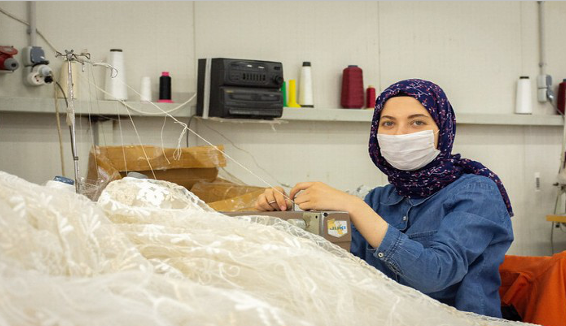|
COVID-19 crisis, a wake-up call on social protection for workers
The need for universal social protection in the wake of the COVID-19 pandemic has been underlined at a virtual conference of workers’ organizations leaders from national trade union confederations across continents.
Workers’ representatives participating at the Fourth meeting of the “Social Protection, Freedom and Justice for Workers Network” , which took place on 9 December, explained how their organizations have been acting as key players in the context of national responses to the COVID-19 crisis and pandemic. From the very beginning, workers have been strongly advocating for the extension of social protection to protect workers and communities from the devastating effects of the crisis, and have contributed to the formulation of various social protection responses and measures at country level.
The meeting took place at a particularly challenging moment for workers around the world due to the severe health and socio-economic consequences brought about by the COVID-19 pandemic.
Global crises impose heavy costs on societies. However, there is a great injustice when costs are disproportionately borne by those who do not have comprehensive and adequate social protection coverage,” said Shahra Razavi, Director of the ILO’s Social Protection Department (SOCPRO).
This crisis has been a renewed call for countries to reinforce efforts towards achieving the UN’s Sustainable Development Goals on social protection for eradicating poverty and achieving universal health coverage (UHC), the meeting heard.
Many countries have introduced temporary social protection measures in response to the crisis,” said Maria Helena Andre, Director of the ILO’s Bureau for Workers Activities (ACTRAV). “However, recovery will only be sustained if countries are able to progressively transform such temporary measures into comprehensive social protection systems.”
The fallout from the pandemic has underlined the need for governments to make decent work a reality for all.
A new social contract must be based on investments in jobs everywhere, and the commitment to a floor on rights for all workers as laid down in the ILO Centenary Declaration and married with universal social protection,” added Sharan Burrow, Secretary-General, International Trade Union Confederation (ITUC).
Meeting participants also discussed the shortfalls of past pensions reforms, which limited the fiscal burden on states and transferred costs and risks to individual workers.
Long term sustainability of pension schemes is guaranteed by strengthening the financial base through progressive taxation, tackling tax evasion, and ensuring that employers pay their fair share of contributions,” said Chris Roberts of the Canadian Labour Congress (CLC).
Participants also discussed the urgency and need for greater international solidarity to accelerate universal social protection. Professor Olivier De Schutter, UN Special Rapporteur on Extreme Poverty and Human Rights, explained the proposal of a Global Fund for Social Protection, an idea that has been advocated by the international labour movement. The idea of such a Global Fund starts from the finding that social protection floors are affordable, provided that low-income countries receive international support in order to complement their own efforts to mobilize domestic resources.
|



